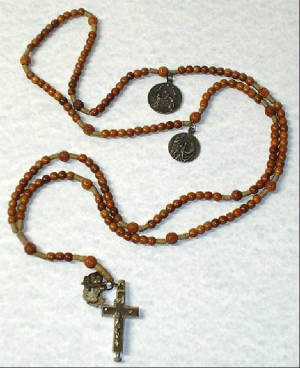|
The rosary probably began as a practice by the laity to imitate the monastic Divine Office, during the
course of which the monks daily prayed the 150 Psalms. The laity, many of whom could not read, substituted 50, or even 150,
Ave Marias for the Psalms. This prayer, at least the first half of it so directly biblically, seems to date from as early
as the 2nd century, as ancient graffiti at Christian sites has suggested. Sometimes a cord with knots on it was used to keep
an accurate count of the Aves.
The first clear historical reference to the rosary, however, is from the life of St. Dominic, the
founder of the Order of Preachers or Dominicans. He preached a form of the rosary in France at the time that the Albigensian
heresy was devastating the Faith there. Tradition has it that the Blessed Mother herself asked for the practice as an antidote
for heresy and sin.
One of Dominic's future disciples, Alain de Roche, began to establish Rosary Confraternities to
promote the praying of the rosary. The form of the rosary we have today is believed to date from his time. Over the centuries
the saints and popes have highly recommended the rosary, the greatest prayer in the Church after the Mass and Liturgy of the
Hours. Not surprisingly, it's most active promoters have been Dominicans.
Rosary means a crown of roses, a spiritual bouquet given to the Blessed Mother. It is sometimes
called the Dominican Rosary, to distinguish it from other rosary-like prayers. It is also, in a general sense, a form of chaplet
or corona, of which there are many varieties in the Church. Finally, in English it has been called "Our Lady's Psalter" or
"the beads." This last derives from an Old English word for prayers and to request.
The rosary has been called the preparation for contemplation and the prayer of saints. While the
hands and lips are occupied with the prayers, the mind meditates on the mysteries of the Incarnation and Redemption represented
by the decades. Meditation is the form of prayer by which the one who prays uses the mind and imagination to consider a truth
and uses the will to love it and form resolutions to live it. In this way the heart, mind, and soul of the Christian is formed
according to the Gospel examples of the Savior and His First Disciple, His Mother. In God's own time, when this purification
of the heart, mind, and soul has advanced sufficiently the Lord may give the grace of contemplative prayer, that special divine
insight into the truth which human effort cannot achieve on its own.

Return to Rosary Page
Return to Home Page
|
